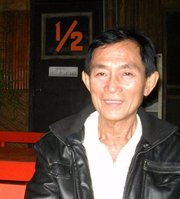Hole of Justice
by Peter G. Jimenea Crass-Justice
When the eight (8) Supreme Court (SC) Justices led by Chief Justice Renato Corona approved the Temporary Restraining Order (TRO) for the travel out of the country by former president Gloria M. Arroyo and husband Mike, they deliberately ignore the unfixed glitches of their order.
Although the required bond was complied with by the P2M cash paid by the former president, there was no hearing conducted for such order when public belief says it is a must. Aside from that, is the lack of an accomplished undertaking that the president will return to the country if need be.
Funny indeed but the pro CGMA justices inadvertently overlooked they are inviting impeachment for that drastic move attempting to put ineffective the hold departure order (HDO) issued by Sec. Leila de Lima of the Department of Justice, against the Arroyo couple.
\
Her lawyers say the president will come back after treatment of her illness by doctor-specialists of other countries. But the public tend to believe otherwise. Beside which, if it is for the personal interest of CGMA to be treated of her illness, what about the national interest or, of the majority?
There is a widespread belief that once the couple get out the country, it is hard for the government to compel them to return and face the charges filed against them. Yes they will come back, but only after the next presidential elections where a new administration takes place.
This is what Sen. Ping Lacson did when he was under persecution from stooges of PGMA and husband Mike. Had Sen. Lacson been arrested, today I can surmise he is still languishing in jail. This is what the growing strong public perception hinted at.
What’s more, after CGMA’s doctors say she is already fit as out-patient, gnomish members of Congress insisted she should be placed under house arrest not in jail. Deliberate or not, they skipped the story of what they did to former President Joseph Estrada.
They jailed the former president for plunder when the P200M is not taxpayers’ money but “jueteng money.” The money was derived from gambling which the latter has deposited to the Muslims Youth Scholarship Foundation account to help the poor but deserving Muslim students.
This is the problem if some of the SC Justices easily yield to temptation of greed. Former Pres. Estrada was right to label crooks in the judiciary hoodlum-in-robes. Former SC Chief Justice Hilario Davide, Jr. has also his story of absurd legacy that won’t easily go away.
He applied the crass-justice he has in mind to justify the ousted of the former president - “constructive resignation.” Little did he know that after reading the story of his words of wisdom, members of the judiciary of other countries smiled to the ears
Imagine buying revolving chairs for SC Justices at P250,000 each? His son has also controlled all projects of the SC with juicy funding. His daughter cornered the replacement of all the window curtains at the SC office. In short, his family has also control of the many projects of the SC.
Then here comes another SC Chief Justice Artemio Panganiban who, during the oath-taking of GMA (after Pres. Estrada was ousted) said that the little lady’s rose to power is the will of the above. Who is he kidding? He’s already in the pot but jumped into the fire. God never sanction a collusion of evil desire. What a shame!
Unfortunately, we have been treated with justices elevated to the SC not by managerial capability but by political expediency. Look at SC Chief Justice Renato Corona. He is hell-bent to protect CGMA who pushed him to the top through a midnight appointment. Thus, despite the residual imperfection of the TRO, their will was done!
The law says there is no general formula or fixed rule for the determination of a probable cause. The hole of justice depends to a large degree upon the finding or opinion of the judge. When money talks, however, a lot of judges have that large propensity to listen. Thus, so many judges, yet, so little justice!
